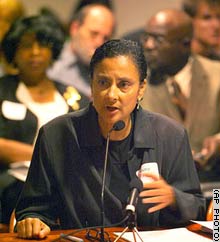Audio clip: Adobe Flash Player (version 9 or above) is required to play this audio clip. Download the latest version here. You also need to have JavaScript enabled in your browser.
“The first charter school movement in the United States started from the Virginia Massive Resistance campaign,” said Shanta Driver, an education activist from Detroit and national co-chair of By Any Means Necessary (BAMN). “[It] was a campaign to defeat the desegregation order of Brown v. Board of Education, and it was local, white, racist organizing to create schools throughout the south that would be private schools, publicly funded and that wouldn’t be subject to court ordered desegregation.”
This past April, Driver and other activists came to D.C. to protest President Barack Obama and Secretary of Education Arne Duncan’s education policies which place great emphasis on promoting charter schools. In the south, charter schools “are, in their majority, all white schools,” Driver said. “And they’re being created combining public funding and private funding to create a separate educational system for many, many, many young white people. And it’s just such an irony, and it’s just such a terrible thing that that area of the country that had made the greatest gains in integration, that surpassed the north in terms of creating schools that were multi-cultural and racially integrated and class-wise integrated, socioeconomically integrated, are now retreating back towards segregation and separation and atomization.”
“In truth, it was the victory of the civil rights movement over that first drive for charter schools that really made public education the universal education for everyone in the United States,” Driver said. “[Public education is] the only service available to people who don’t have papers, whether you are documented or undocumented, you have a right to a public school education all the way through high school in this country. It’s our broadest and most important democratic right and we’re seeing that now being challenged [by]… some of the same forces that always opposed integration, always opposed the diverse and multinational, multicultural character of public education.”
“We just don’t see how we can maintain a single America, an America that stands for progress, an America that can reclaim our heritage of prosperity while that is occurring. We think we must unify again and defend public education as the great egalitarian and democratic gain for this nation that it has been.”

